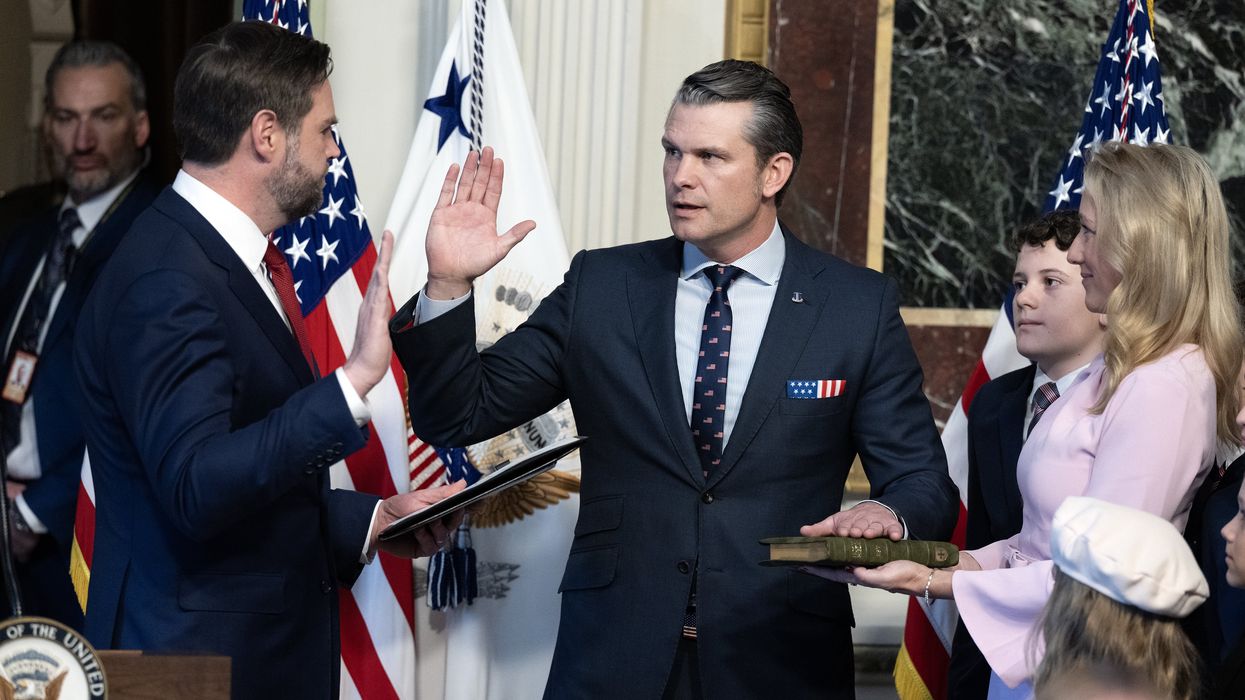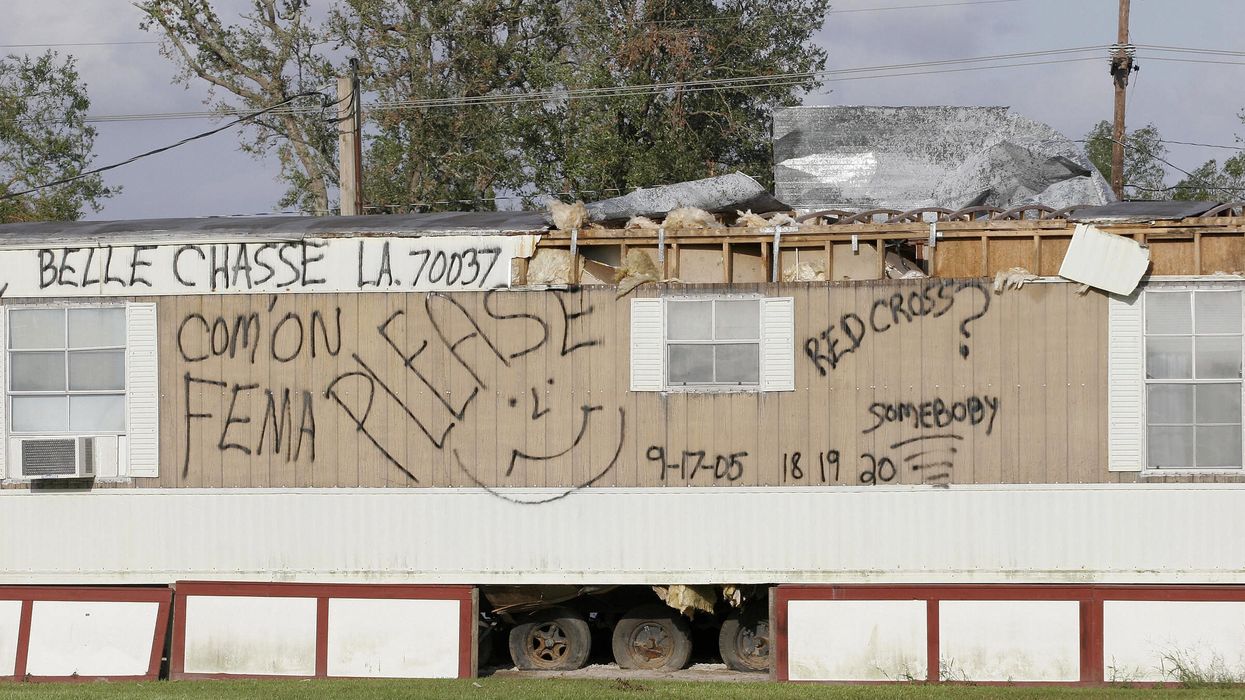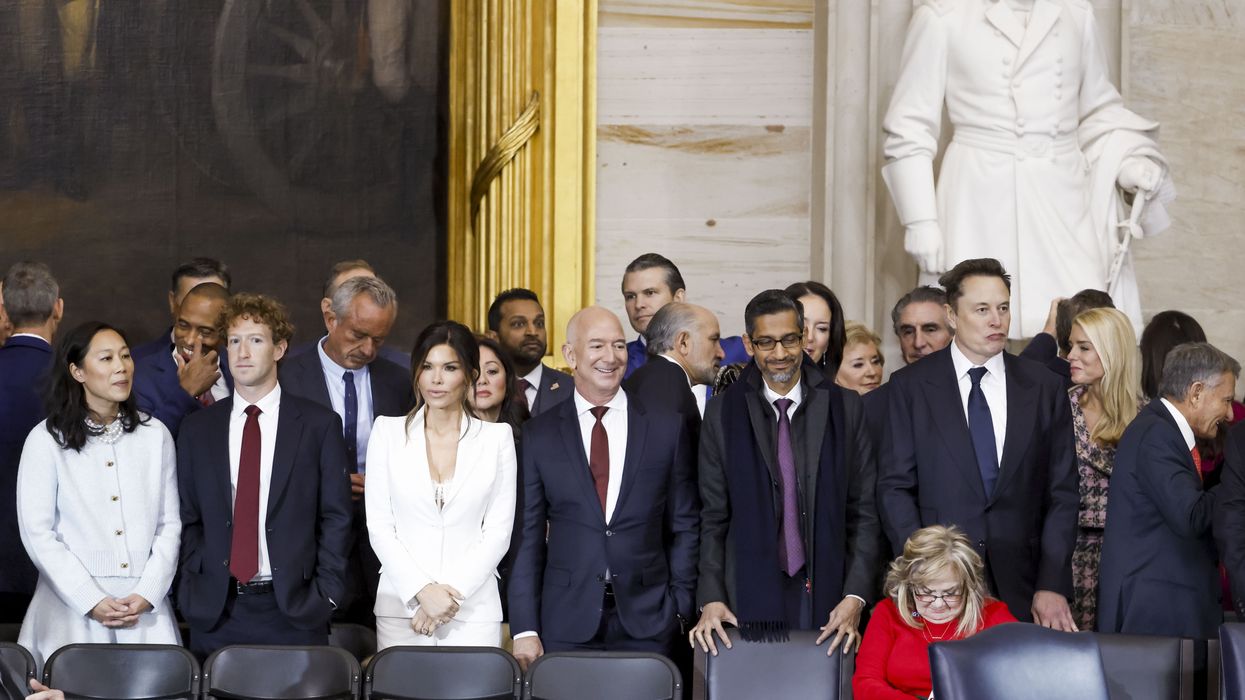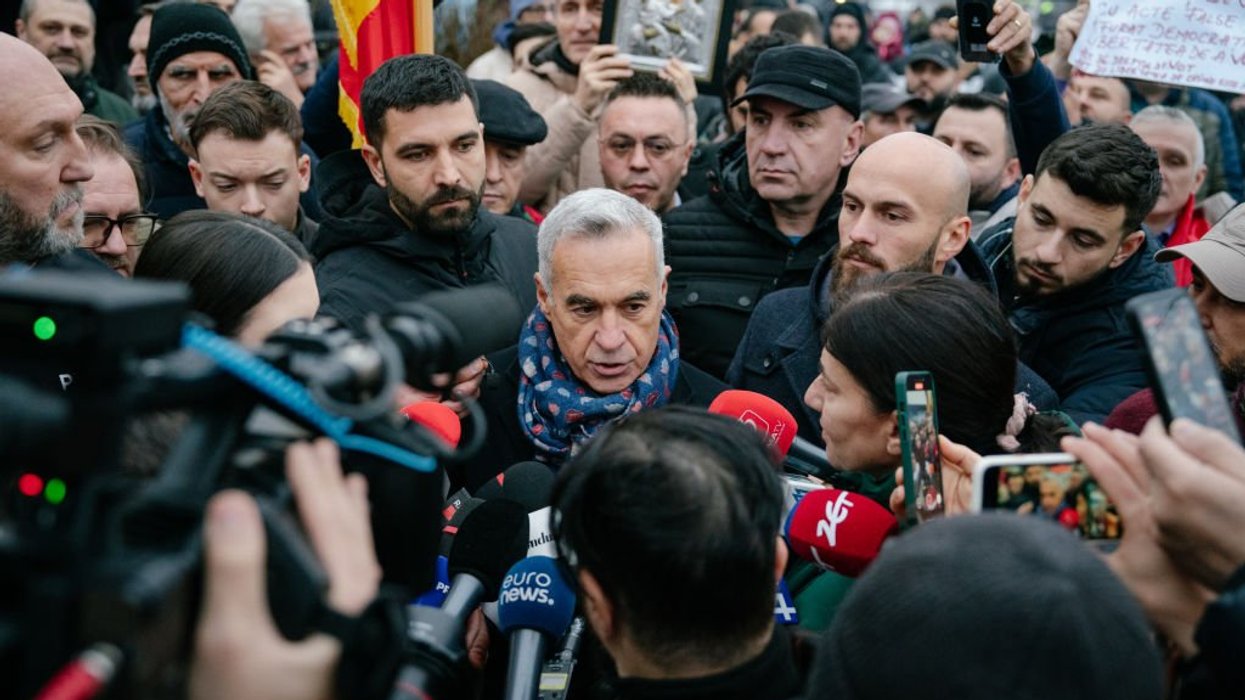Glenn invited The Covenant author Timothy Ballard onto radio this morning to discuss National Day of Prayer and the role of faith in the founding of the country. You can purchase the book here!
Transcript of the interview is below:
GLENN: I want to tell you that today is the 17th of May. Today plays a very important role in American history. Today is the day that George Washington in 1776 said we have got to beg for forgiveness, humiliation fast and pray and beg the Lord to be on our side or we're never going to beat the British. This is the first time that he really did this. It's a very important day. We'll explain what happened because ‑‑ what I believe because of that in a few minutes and I also want to introduce you to somebody who has written a new book that ‑‑ and I just started to tell him this story. Tim Ballard is with us and I want to tell you the story of how this book ‑‑ why this book is important to me and why it should be important to you. About two years ago ‑‑ correct me if I'm wrong, Pat. Wasn't it about two years ago? It was before we went ‑‑ it was before we went to Israel.
PAT: Yeah, I think so.
GLENN: Maybe a year and a half ago. I went to some of the biggest scholars on American history, and Peter Lillback, who is a George Washington ‑‑ he probably knows more and has more record of what George Washington said and wrote about when it concerns God than anybody else. He's probably the biggest name in George Washington religious information. And I called a few of these professors and researchers up and I said, listen, I have a theory. I have a theory that we made a covenant starting really with Columbus, really then again, it really took shape with the pilgrims. They honored that covenant. That gave us the generation of the founders. And with Whitfield coming over, he laid the groundwork to really cement it and George Washington and the founders made a covenant with God and it is the reason why we were founded, why we were protected and why Israel was established and we won't make it because now we've accomplished that one task. The question is now, are we over because I believe all the founders saw it, they were laying the foundation, are we over or do we renew the covenant. Every single one of them said, you won't be able to prove that, except for Peter Lillback. Peter Lillback said, Glenn, I can't think of anything that says that that's true. And I said, Peter, would you be willing to look into it? Just look into it. He called me three months later and he said, "Glenn, I can't believe it. There's a ton of evidence just from George Washington that that's true, that that's what he believed." He actually published a little teeny book on the founders and Israel based on that theory. So now fast forward, Pat, when was it, fall of last year, some place? Yeah, because we were still in New York City.
PAT: Mmm‑hmmm.
GLENN: I hear about somebody who's working on the covenant, the Founding Fathers. I hear about this separately. We get a phone call, Pat gets a phone call from somebody who knows you and says, Pat, you guys have got to get together with Tim Ballard because you won't believe what he's found. It's exactly the same thing. You've done all the homework. You've done all of the research. This is not your field of expertise. This isn't really even what you were setting out to do when you were going to write a book, right?
BALLARD: That's right.
GLENN: What were you ‑‑ bring the microphone in to you. What exactly was your ‑‑ what is your goal of when you started to write this book or when you started to do the research? What were you doing?
BALLARD: Well, my background is kind of in the foreign policy apparatus. I work for the United States government. I do a lot of work overseas. And I was fascinated by the power for good that the United States is. I work in child exploitation and we ‑‑ I get to witness the greatness of this nation and liberating the oppressed overseas and abroad and I thought I'm going to ‑‑ you know, it kind of informed my research into the foreign policy side of things and so I wanted to look into that. I thought, hey, I'm going to write a couple of chapters on the founding to kind of set this up. Well, those couple of chapters turned into a whole book because I was absolutely shocked at what I found. The question I had is what is the power for good. I mean, 200 years ‑‑ I mean, this country's an infant, 200 years old or so. Why are we so powerful? What I found was that word: The covenant. The founders knew of this covenant. It's a covenant attached to the covenants of ancient Israel. They knew that power, they tapped into that power, and it worked.
GLENN: We were talking yesterday off air about the prayer at Valley Forge where George Washington gets down on his knees and he always prayed looking up, he always was praying up to God and he was very, very humble. And here he is in Valley Forge. He goes off into the woods by himself and he kneels down in the snow. He always knelt when he prayed and he spoke his ‑‑ he spoke his prayer. Unbeknownst to him, he thought he was alone, there was someone who was on the side of the British watching him.
BALLARD: Isaac Potts. That's right. And he sees this. He feels this power. He feels the power of this covenant that Washington is making, this connection with heaven. He runs home to his wife and says we're on the side of George Washington. I'm changing, I'm changing sides because we're going to win this.
GLENN: He's like, it's over. For Great Britain, it's over.
BALLARD: That's right.
GLENN: You should have heard this man pray. And if this guy is praying and this is what ‑‑ he's using the power of God ‑‑ it's over. It's an amazing story. Okay. So explain what the covenant is exactly.
BALLARD: The covenant ‑‑ well, really look at the Old Testament. The Old Testament establishes a covenant. God says to Israel, I will be your God and you will be my people. And he promises them liberty and protection, prosperity, if they adhere to him. If they turn their hearts to him. And there's this story that develops in the Old Testament, a fascinating story. This story continues in the promised land of America.
GLENN: Do you have any doubt in your mind that Columbus, when he first went to Spain, he was so arrogant, he didn't understand the covenant. But the second time when he went after living with the monks for a while, he was humble enough to understand the covenant and got it when he first came over.
BALLARD: He got it. And all you have to do is look in his book of prophecies, his diary. He named it this. He understood ‑‑ I mean, he understood things so profound, he understood that the connection to Israel. He believed that his discovery of this new world that he thought was the Indies, he believed that this was going to create something, start a chain of events that would actually ‑‑
GLENN: Reestablish Israel?
BALLARD: Exactly, exactly.
GLENN: Right. And that's exactly the same thing that the pilgrims felt.
BALLARD: Exactly. The pilgrims get here, they call themselves the new Israel. John Winthrop gives the speech of American literature, the City on the Hill speech. That's an invocation of the covenant. And he says in his writings, it's a capital C, he puts the Covenant, the Covenant, we're making a Covenant. We're taking out a commission, he says. And he repeats the same pattern. It's like reading the Old Testament all over again, reading American history. They name their towns after Israelite towns. Salem, for example, a derivative from Jerusalem, they name their children Hebrew names, they invoke the covenant and the miracles happen. The miracles immediately fall upon them.
GLENN: One of my favorite stories is George Washington makes this covenant, tells the American people, make the covenant on this day. I've asked people and I don't know if you remember but I asked on this day, fast and pray, make the covenant with God, I'm fasting, praying, I'd love for you to join. Pray for the country, make the covenant with God because that's what changed everything. Now, he did it twice. He did it here and then he did it again in July, right?
BALLARD: That's right.
GLENN: Was it July?
BALLARD: That's right.
GLENN: Made it in July. Tell me about, I find this, this is the first evidence that it is starting, it has an effect. If you read history and you read the journals on either side, the Battle of Long Island is the first sign of the miracles of God.
BALLARD: And it is an unbelievable miracle. I mean, look at this. George Washington, he's a farmer. He's got citizen soldiers with, you know, they barely know how to shoot a gun and they are going up against the world superpower. It was the largest naval fleet ever sent from one nation to another nation in that time in history. What's he thinking? How in the world is he going to do this thing? He crosses the East River onto Long Island and they have their first major battle. Well, the Americans get routed and the British think, this is over. We're going to win this thing. They're laughing, as the colonists were running back towards Manhattan for safety. A miracle happens.
GLENN: One of the reasons why they're laughing is because this he know they have British warships in the river, behind the U.S. troops. So as Washington is coming in, the British warships are coming down the river and they are going to meet Washington from behind. So they'll slaughter because they have them surrounded, they will slaughter them from both sides.
BALLARD: It's the ultimate trap.
GLENN: Right.
BALLARD: It's over, this revolution's over. Washington tells the commanders, we're going to cross the river. They say, how are we going to do this thing? Just trust me, we're going to do it. When night falls, we're going to do this thing. Night falls, and with that night comes an enormous windstorm that pushes these British ships out of the way and Washington makes the ‑‑ starts making the crossing. And then the wind shifts westerly to help facilitate this exodus, if you will. And then what's happening? The sun's going to come up, it's going to expose this scheme and the British land ships will see it. It will be over. What happens? David McCullough explains it better than anyone I've found. As night ‑‑ as the sun comes up, a pea soup fog drops down right over where Washington's crossing. Not so much on the Long Island side or the New York, Manhattan side, but right where Washington's crossing.
GLENN: They are all ‑‑ they all say on their journals, nowhere else on the island, nowhere else in the area. Just over Washington's troops.
BALLARD: And they make the escape. 20 minutes after they get to the other side, the fog dissipates and the British are standing there ‑‑
GLENN: Where did they go?
BALLARD: ‑‑ putting their hands on the air, "What on Earth just happened."
Now, I want to say something else about May 17th. I just found this. May 17th John Witherspoon, an underrated founding father, one of the signers of the declaration, on May 17th he gave a speech to his congregation and he said, "We will win this war because the grand artist will utilize the elements." And I kid you not, I'm not making this up. He said he will send. God almighty will send an unforeseen fog to halt the operations of the enemy. May 17th, the very day Washington's fasting and praying for that very miracle, the fog comes. Absolutely stunning. And this is just one of I don't know how many experiences that follow this pattern.
GLENN: Okay. So we're going to take a quick break and then we'll come back. You contend that we ‑‑ I contend that we broke the covenant.
BALLARD: Yes.
GLENN: And that it can be made again, you contend. It's really not that hard. Right?
BALLARD: We can reactivate the covenant, absolutely.
GLENN: Okay. Back in just a second with Timothy Ballard. The name of the book is The Covenant: One Nation Under God.
PAT: The American Covenant.
GLENN: Okay. All right.
BALLARD: Well, actually now it's The Covenant.
PAT: It is The Covenant now? Okay.
GLENN: The Covenant: One Nation Under God. I think you were reading an earlier version of it.
PAT: I think so.
GLENN: The Covenant: One Nation Under God. Is it available everywhere?
BALLARD: It's at Amazon right now.
GLENN: Okay.
BALLARD: Legendslibrary.com.
GLENN: Okay. And I believe we have links also at GlennBeck.com. Grab this book. You'll learn so much about history and it all makes sense. When you read it, you're like, "Oh, my gosh." It's what I've been saying for about a year and a half now. It's not that hard. It's really not that hard. There's no way to win. Exactly what George Washington and the founders knew: There's no way to win here, gang. You're outnumbered, there's no way to win. Yes, there is. Exactly the way Washington won. Exactly the same way. Using the same firepower. It is the only way to win. The Covenant: One Nation Under God. Today is the 17th, the day that Washington begged the American people, "Make the covenant. Make the covenant." At least start the journey and learn what the covenant is historically speaking. It's an amazing, amazing ride. We'll give that to you here a little bit more here with Timothy Ballard in just a second.
First our sponsor this half hour, it is Freedom Works. The restoring love event is coming July 28th and I want you there. I hope you're planning on attending. Freedom Works is going to be joining me at this historic event and they are also hosting what's called Free PAC. It's happening on Thursday, July 26th here in Dallas, Texas. This is something that you do not want to miss. This is the kickoff of a global Tea Party movement. The Tea Party movement, it's not enough just to save America. God is not neutral on the freedom of mankind, and we can't do it alone. And we're about to lose the rest of the globe as well. I've been over to Europe and I've talked to European parliamentary members, I have talked to people in the Knesset, I've talked to people from all over the world, from the former Soviet bloc. These are Tea Party activists. And I've also talked to politicians over there. Some of the politicians have asked, can you help us start a Tea Party? No, I don't think so. Not with politicians, no. But the activists, when I went over to Europe, I called Freedom Works and I said, "Would you help me put these guys together." Got into a room with, I don't know, 30 of them. There are now 1,000 Tea Party freedom‑loving activists over in Europe and the former Soviet bloc and all around the world that are coming to Dallas to this event on the 26th of July. They are begging for Tea Party activists to come and help them, teach them the principles of America. Let's unite, and the very first time ever a Tea Party movement has been organized globally with Free PAC from Freedom Works. If you'd like to get more information and you want to preregister, please do it now. They've just rented the American Airlines arena. That only seats I think about 25,000. The Dallas Cowboys stadium is already sold out. Please register for this now. Go to FreePAC.com. That's FreePAC.com and register now for a summer that will go down in American history on the positive column.
(OUT 11:22)
GLENN: Timothy Ballard is the author of the new book The Covenant: One Nation Under God, America's Sacred Connection to Ancient Israel, and it is, it is stunning when you tie history together and you really look at what not somebody's opinion but you look at their own words and the pattern of American history. It is always the same. We connect with God, we renew this covenant and there's this moment of brilliance that moves us forward and then we get fat and lazy and it goes away and then there's a flash of brilliance, and it happens every single time. It happened in the American Revolution. I contend we started to break the covenant about 1830, maybe a little bit before that, and the covenant wasn't really, it wasn't strong enough because of ‑‑ we still had the blood of slavery on our hands, and it started to fall apart. But it was the Christian movement, the covenant again that brought us forward with Abraham Lincoln. It's what saved us.
BALLARD: That's absolutely right. That's absolutely right, yeah.
GLENN: Before we ‑‑ before we move forward, I want to go to the past. First let's go to the ancient past.
PAT: Yeah, Tim, you say that almost every prophet of old, like Old Testament prophets prophesied, foresaw America. I don't think a lot of people believe that.
BALLARD: Yeah, that's right. That's not a super popular idea.
PAT: No.
BALLARD: I hear a lot, I hear a lot that ‑‑
GLENN: America doesn't exist, nowhere in the Bible.
PAT: Yeah.
BALLARD: Doesn't exist in the Bible, therefore it's going to disappear off the face. You know what? I have a very different idea, a very different theory. I believe that these ancient prophets knew of the promised land of America. I believe that ‑‑ well, there's all sorts of prophecies about who the lost tribes would be and where they would go. And really you need to read the book to get the whole context. I won't be able to do it in a quick interview. But I believe, and I believe the evidence is strong, that there ‑‑ that God led migrations out of Israel and that they ‑‑ he led them to the promised land of America. This was another exodus of sorts.
GLENN: The pilgrims believed it, Columbus believed it.
BALLARD: Yes.
GLENN: All of them believed they were completing the journey that Moses started. All of them.
BALLARD: Yes.
GLENN: All of them.
BALLARD: Absolutely. And they called George ‑‑ I mean, when George Washington came to town, they called him their Moses.
GLENN: Yeah.
BALLARD: Their Joshua. This was a theme that, yeah, this isn't so much my idea ‑‑
GLENN: This goes ‑‑
BALLARD: ‑‑ as it was the pilgrims' idea.
GLENN: This goes to Bruce Feiler's book. Do you remember Bruce Feiler's?
BALLARD: American Prophet.
GLENN: Yes.
BALLARD: Awesome book.
GLENN: Yeah, awesome book.
BALLARD: Yes.
GLENN: Here's a guy who's Jewish that says look at the role of Moses every single time in American history. It's Moses. It is the completion ‑‑ the Statue of Liberty is Moses.
BALLARD: Yes.
GLENN: It is ‑‑ she's holding the two tablets of the law. It's Moses breaking the chains of slavery. That's what that is.
BALLARD: And Bruce's book is also complemented by another book. I don't know if you heard of a book called The Harbinger by Jonathan Cahn.
GLENN: I have heard of that. I don't think I've read it.
BALLARD: Best selling book. Him and I have been talking this week. He says the same thing. He's also, he's a Messianic Jew, runs the Jerusalem Center, he has a ministry. Unbelievable book. Says the exact same thing that I'm saying. The covenant has been extended from Israel, from ancient Israel to America.
GLENN: If you look at the ark of history, there had to be a plan to restore Israel and it's my contention that we were that piece. We were that plan. We've done it. Now the question is, we've done our job. Are we done as a nation? More in a second.
(OUT 11:31)
GLENN: We have Timothy Ballard on. He is the author of a book called The Covenant. He will be on with me tonight on GBTV and we'll get into a lot more specifics. And this is really important. And look, we have ‑‑ we have lost stations, we have lost, you know ‑‑ we've lost friends, you name it because I really truly believe that God is the answer. I don't care what religion you are; God's the answer. It's the only way out. George Washington knew it. We can play the little PC game all you want, but it's not going to change the answer. And because I truly believe it, I'll say it. And if it means that, you know, that's the last thing you ever hear from me, okay, that's the last thing you ever hear from me. It's the truth. It's the truth. April 30th is a very important day. Today is a very important day in history, May 17th. This is the day that George Washington said make a covenant with God. America, please get on your knees and make a covenant for divine protection for this American experiment because we're never going to win. And he said, fast and pray. I've asked you in the past if the you would join us on this day, May 17th and fast and pray for the one specific reason. Please, we'll be your people. We'll turn our hearts to you if you'll just protect us. We'll do what you say if you please protect us. That's the covenant that George Washington was talking about.
Now Timothy Ballard has the book out The Covenant and it is a theory that you're not going to get any place else and it's really, I mean, you weren't even looking for this, were you?
BALLARD: I was not, no.
GLENN: It's not really even a theory. It's theory that we can restore it, I guess. I believe we can. But it's not theory. It's historic fact on this, what this means.
BALLARD: It's their words and their actions, I'm speaking of the founders, absolutely.
GLENN: Got it. So tell me about April 30th. Why is April 30th an important day?
BALLARD: April 30th should be a national holiday. April 30th was a day of covenant‑making in this land like nothing else perhaps we've ever seen as far as covenant‑making goes. This is the day George Washington took his oath of office. It's the picture that we're utilizing for the cover of the book. What happened on that day in that moment will blow your mind. It blows my mind. First of all, a proclamation goes out a week before: Come to Federal Hall in New York City. That's where the capital was at the time. Come and see your president take his oath and come ready to pray. This was the press sending this out. At 9:00 a.m. the bells will ring in the city. Go to your house of worship and pray that God will accept this land as his.
GLENN: You're probably one of the very few besides David Barton and me that get teary‑eyed talking about this stuff.
BALLARD: I do. I get emotional. And then what happens? It's not over yet. George Washington comes out and takes his oath, raises his arm in the fashion of a covenant‑maker and places his hand on the Bible. But not just on the Bible but in the Bible. Where in the Bible? Historians muse at where he placed his hand because they think for a deliberate man like Washington, who knew posterity was watching, why in the world did he just flip that book open and put his hand anywhere? He didn't just put it just anywhere. Pat talked to me about, asked me about the ancient prophecies of Israel. I can't ‑‑ I don't have time to explain it. You've got to read it. It's better to discover it through reading the whole context of everything. Where he placed his hand told the world and the nation that he understood the covenants of Israel and he understood this covenant had been imported by the founders into the United States of America.
GLENN: If I'm not mistaken, one other president has opened the book, opened the book in exactly the same page and did exactly the same thing. Do you know this?
BALLARD: I don't. I don't know this one.
GLENN: Ronald Reagan.
BALLARD: Oh.
GLENN: First term.
BALLARD: This is a man, Ronald Reagan, who understood the covenant.
GLENN: Yes. It's a guy who then got out there and said it's an evil empire.
BALLARD: Yes.
GLENN: And it needs to be destroyed.
BALLARD: Yes. A little hint. I've found that those presidents who back, who back Israel ‑‑ I'm talking about the nation state of Israel today ‑‑ always are the ones who understand the covenant. Those who don't back Israel do not understand the covenant.
GLENN: Harry Truman did.
BALLARD: Harry Truman understood the covenant. He's in my book because he understood it so well.
GLENN: Yeah.
BALLARD: But the day continues on April 30th. It's not over yet. Washington after he does this thing, invokes the covenant, the people go are there praying. He goes in ‑‑
GLENN: Hang on. He also added to the oath ‑‑
BALLARD: Yes.
GLENN: ‑‑ "so help me God."
BALLARD: So help me God.
GLENN: That was an ad lib from him.
BALLARD: Absolutely. He did this thing and then he walks in and he gives what I call the Smiles of Heaven speech which is what? An invocation to the covenant. He said the smiles of heaven can never be expected upon a nation that disregards the rules of order and right, which heaven itself has ordained. That's a quote from this speech. He says other things invoking the covenant, clear invocation. Then it's not over yet. He calls the government, the senators, their representatives, newly elected, takes them down to the street and they walk. They march. It's a procession, a religious procession. And where do they go? Where does Washington lead them? To St. Paul's chapel. The first joint session of congress is now upon them.
GLENN: Okay. Hang on just a second. It's important to know on that walk there were all faiths.
BALLARD: Absolutely.
GLENN: There was everyone arm in arm. All faiths walking arm in arm intentionally. They're all walking together in ‑‑ to worship God. All of them.
BALLARD: Absolutely.
GLENN: I bring this up because right now there are so many people that are like, "Oh, I can't ‑‑ well, no, not with you, not because of that. No, well, they're not of my faith." That's crazy talk. Stop it. Stop it.
BALLARD: And this was a huge theme, what you're talking about with George Washington. He talked about it all the time, that every religious sect in this nation needs to be upheld, needs to be given their due freedom, and that was ‑‑ that was key to him and to his understanding of the fruit of this covenant, that all religions. And so he leads them in to St. Paul's chapel and they bow and they pray and they dedicate the land to God. I mean, this day is completely a religious day. It's a religious service, and we do ourselves a disservice by pretending that it was just some token acknowledgment of God, that you might quote Washington here or there. No. The whole entire day of his Inauguration Day was the day that the covenant was further established, was recognized by the nation. And why on Earth I had to dig so deep, I had to find primary sources to find all this stuff, because our historians aren't doing the job.
GLENN: Oh, no. They are doing worse than that. They are erasing all of it. They are erasing all of it.
BALLARD: There are scholars, I get so frustrated. I start yelling and my wife has to calm me down. I read their books and I see ellipses in the quote and I went, what did he pull out? I go look at the original source, it's all the focus of the statement. And it was all about God. What are we doing?
GLENN: Well, you have that with the president. That all men are endowed with certain unalienable rights. Wait, there's a dot‑dot‑dot there. I mean, there's more dots than there are words.
BALLARD: We cannot take God, we cannot take God out of this nation. It's a slap in His face. And we'll lose the blessings.
GLENN: Okay. So tonight I'm going to have you on and we're going to talk about how ‑‑ what the covenant is specifically and how to make it again and what we need to demand of ourselves. And also, if you will, spend some time on what page he opened the Bible to. I just ‑‑ I just showed Timothy something, just got this yesterday. David Barton hand‑delivered this yesterday to me. This is ‑‑ what I'm holding in my hand is a Bible, and everybody says, "Government, it's ‑‑ we're not Christian nation." This is a Bible printed by the congress of the United States of America in 1772. This is the Bible that was printed for the American Revolution. So we don't know the providence on this particular one. This might have been in the hands of Knox, it might have been in the hands of Washington. We don't know who the hands that had this Bible, but this was the one that was given to the revolutionaries. This was for congress. There's eight of these in existence. Anybody who doesn't think that they cared or that they were Christian or that they didn't ‑‑ that they weren't paying attention to God, we've now made this into magic tricks. We've made this into folklore and magic tricks. It's not. It's not. It's very clear. It's a simple formula: Two plus to equals four. You plus a covenant equals security. Prosperity. Peace. That's the way it is. It's just that simple. Join me tonight on GBTV.com for more with Timothy Ballard. The name of the book again is The Covenant available everywhere. It's available on Amazon.com. You can find links to it at GlennBeck.com. Also we'll have more on TheBlaze.com coming up today and GBTV tonight. The Covenant. A book you must get by Timothy Ballard.











